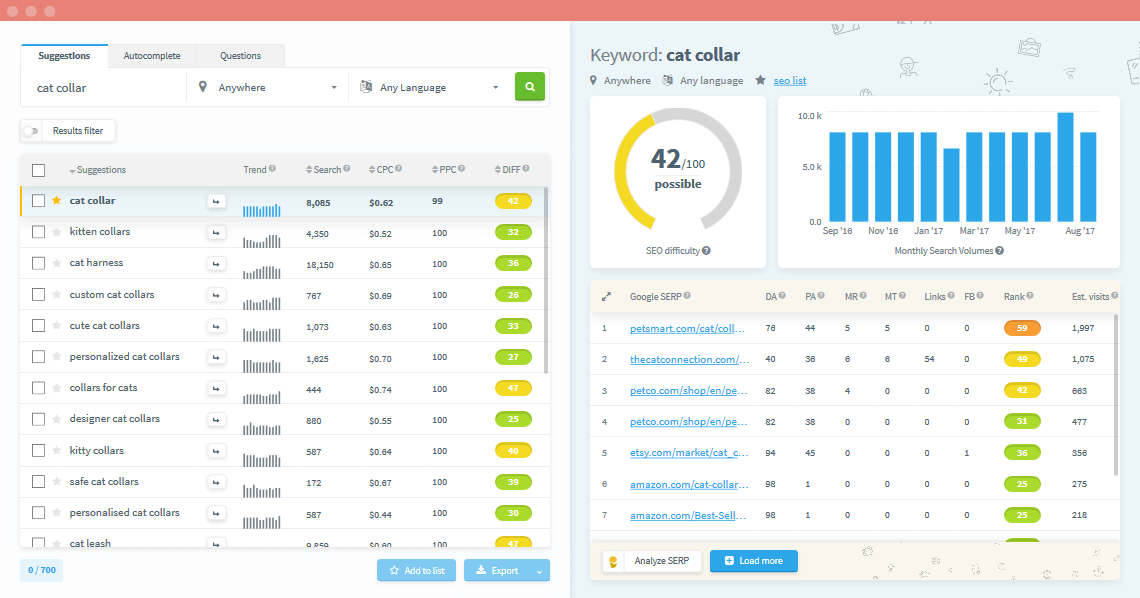Easy Ways to Find Low-Hanging Fruit Keywords for Your Blog

In blogging, keyword research is crucial in determining which search phrases to optimize for your site. Finding low-hanging fruit keywords or those that are within reach is part of that research and an efficient way to gain better reach and higher traffic.
Low-hanging keywords are terms that are already ranking well. These are the ones you need to maximize because of its potential to bring more readers to your blog.
For example, you’re trying to rank for two different keywords; one is ranked at 10th on Google search while the other is ranked 30th.
The smart thing to do when you are given this scenario is to put more work on that 10th ranked keyword. It’s more likely to go up to the first three results on Google than focusing on the latter.
The first three results get 60% of the clicks while those ranked 4th and lower only get less than 6%. See how big of a difference it makes when you rank on top of Google?
Keep in mind that it’s better to focus on keywords that bring actual traffic to your blog because those are the ones that have higher chances of conversions.
Pick your keywords
An essential part of every content you decide to create on your blog would require keyword research first. This is going to be a long process, and we urge you not to take this lightly. Keyword research can decide the fate of how the traffic will go for the content you make. In other words, if you don’t do it, you may end up with content that has little to no readers at all.
Characteristics of low-hanging fruit keywords
When you start your keyword research, here are the three characteristics your low-hanging fruit keyword must-have.
Low competition
A good starting point of finding low-hanging fruit keywords is to look at the competition. The lower competition there is, the better.
Low traffic volume
Keywords with low search demand are also great to rank. Typically, those with at least 100 searches per month is a good number, but you can go even lower than that.
These keywords can be more valuable than those that have higher demand but lesser chances of ranking.
Low difficulty level
If you use tools like Ahrefs or SEMrush, you’ll easily find the ranking difficulty of each keyword when you type in your keywords. It’s up to you to decide which of the keywords you listed match your targets.
If you are a new blogger, it’s important to know that the internet is filled with blogs about different niches. This reason explains why it’s better to aim for the lower competition keywords first. Other characteristics can be a bit complicated because of the way the search engine algorithm works. But eventually, you’ll see better results once you’ve established your authority on your chosen topic.
Tools to use for your keyword research

Keyword research can be challenging to do without using different tools. Doing so not only gives you ideas on what keyword to rank but it’s also a great way to do market research. You’ll uncover which competitor you can rival and what topics are mostly written using the same search terms.
Here are some of the best tools to use:
Google Adwords (Keyword Planner)
Google Adwords is designed for advertising, and it’s also the best place to go to conduct your research and build a list of keywords. It’s free and shows valuable data like average monthly searches and groups of related keywords you can also target.
Google Trends
Another cool free product from Google is Google Trends. The important thing about this tool is it shows you current trends about what people are looking for as opposed to some tool that only shows a history or past data results.
So if you spot a developing topic that’s related to your blog and keyword, the best thing to do is ride and go with the flow.
The downside is your topic can die along with the trend, so don’t just rely on this tool alone.
KWFinder
KWFinder is best for finding long tail keywords with low difficulty. If you want to focus on building your low hanging keywords, then this tool will be your friend.
Additionally, if you want to target the local market, KWFinder can be set to show the results by city, state or country.
Conclusion
What’s best about this process of finding low-hanging fruit keywords is you can just duplicate the techniques you used from your first keyword on to your next ones. If you’re not doing this yet, we suggest you learn and apply this method to your upcoming keyword targeting strategy.
Related posts:
The Only Keyword Research Tools You Need
How to Quickly Build Keyword Lists with the Keyword Planner Tool
Freelance writer for hire by day. Heavy sleeper at night. Dreams of non-existent brass rings. Writer by trade. Pro wrestling fan by choice (It's still real to me, damnit!). Family man all the time.

